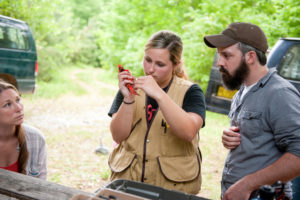Fisheries, Wildlife, and Conservation Biology prepares students to manage and protect populations of fish and wildlife in their natural habitats. This major gives students the skills they need to observe, research, monitor, and assess the impact of environmental change, human behavior, and public policy on animal populations. Using a combination of lab work, technology and field study, students develop conservation strategies that ensure the long-term health of fish and wildlife populations. Students learn a variety of field and technical skills at our six-week summer camp experience.
There are three concentrations in this major: Fisheries Science, Wildlife Science, Conservation Biology. All concentrations study wildlife populations and wildlife management techniques. Fisheries science students focus on freshwater and saltwater fish and their role in aquatic ecosystems. Wildlife Sciences students focus on terrestrial vertebrates with an emphasis on game species. Conservation Biology students focus on species impacted by human activity.
Fisheries, Wildlife & Conservation website has more information about the major and students conducting research, including an interesting article about a student’s experience in Wyoming.
Watch this video!
STUDY ABROAD OPPORTUNITIES: Students are encouraged to take advantage of study abroad opportunities. The Fisheries and Wildlife program has sponsored summer trips to Namibia, Bahamas and Nicaragua.
Courses include:
Conservation of Natural Resources, Wildlife Management, Ecology, Conservation Biology in Practice, Vertebrate Natural History, Principles of Wildlife Science, Human Dimensions of Wildlife
| College |
|
| Discipline |
|
| Academic Department | |
| Departmental Contact | |
| Major Overview | |
| Plan Requirements | |
| Semester Sequence | |
| Related Majors | |
| Skills You Could Develop |
|
| Learn More About This Major | |
| Career Titles |
|
| Learn More About Careers |
